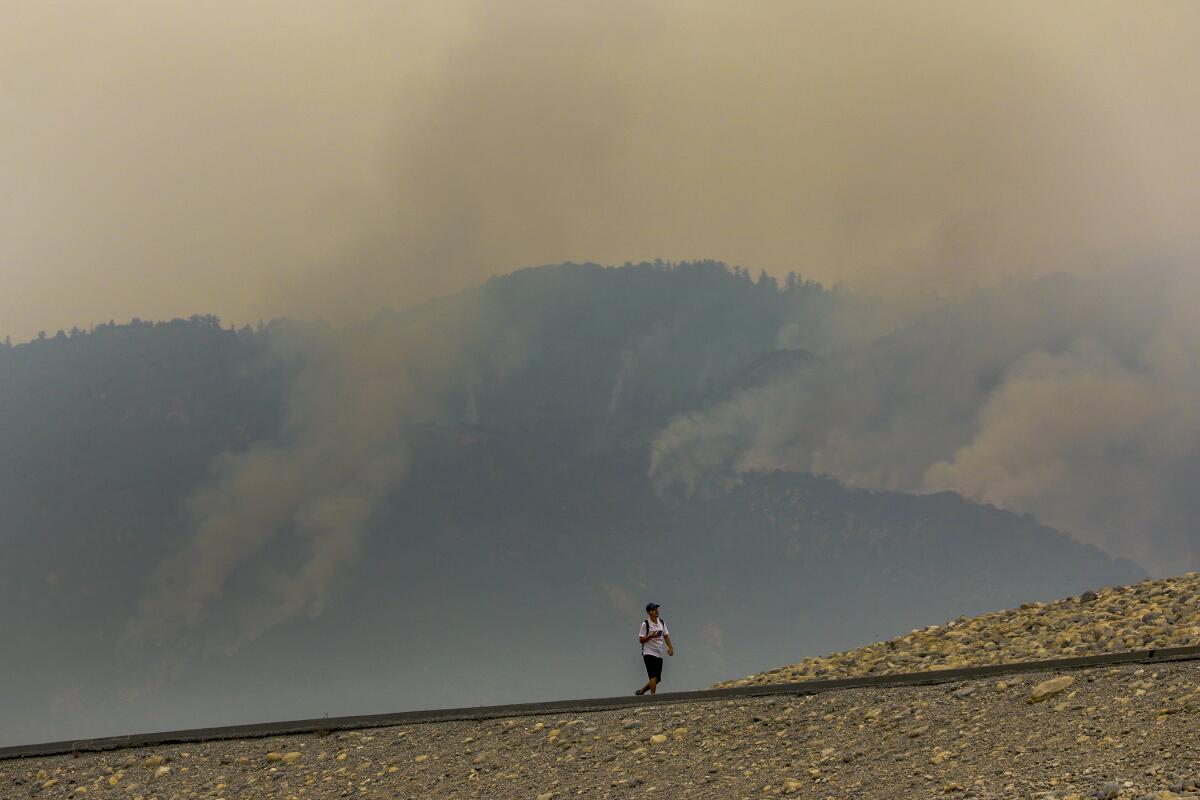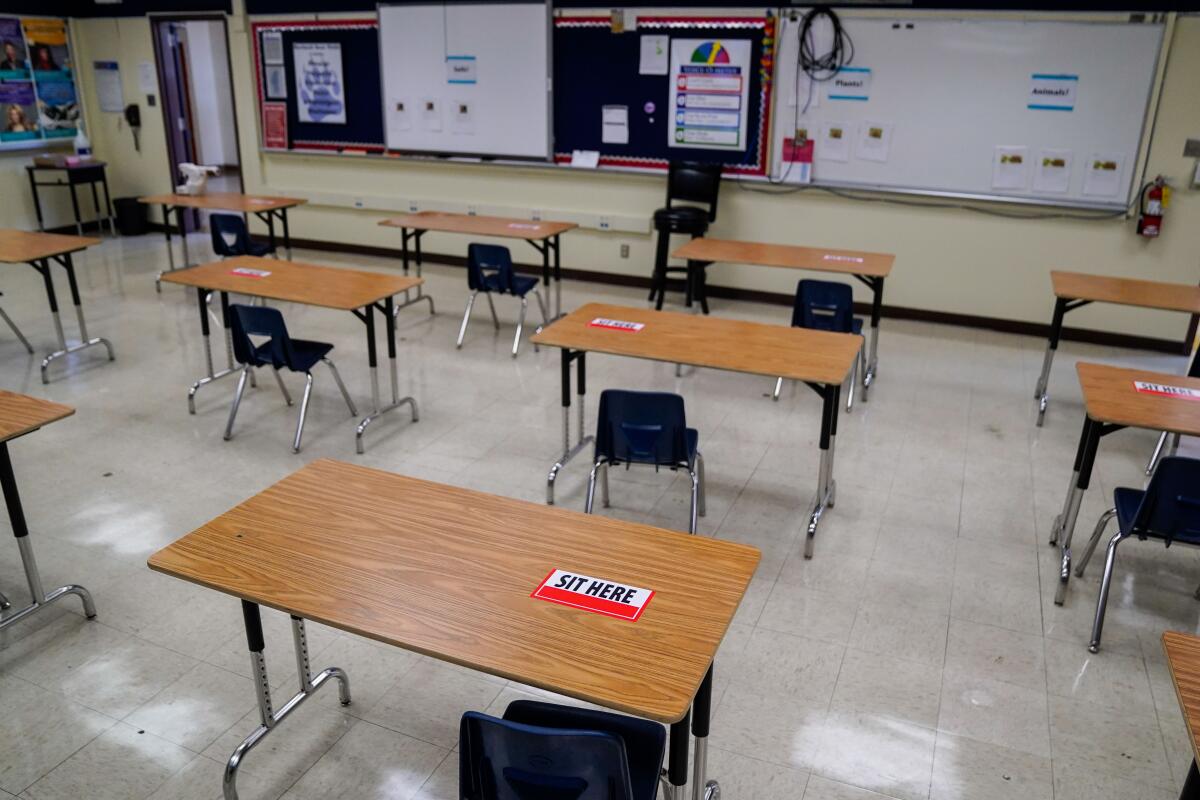Essential California: Climate change’s psychological toll

- Share via
Good morning, and welcome to the Essential California newsletter. It’s Friday, Sept. 11, and I’m writing from Los Angeles.
Sign up for Essential California
The most important California stories and recommendations in your inbox every morning.
You may occasionally receive promotional content from the Los Angeles Times.
In a sunny Australian city known for being one of the world’s largest coal export ports, an environmental philosopher would often field pleading calls from residents.
As they spoke, their distress over the sheer scale of the impacts from the open-pit mines and other heavy industry in the area was palpable.
Sitting at the dinner table with his wife, the philosopher struggled to characterize the specific nature of their pain — a pain “experienced when there is recognition that the place where one resides and that one loves is under immediate assault.”
Glenn Albrecht, the philosopher in question, and his wife, Jill, first thought of the concept of nostalgia — because, as Albrecht writes, the term was once linked to “a diagnosable illness associated with the melancholia of homesickness for people who were distant from their home.”
But the distressed residents of Australia’s Hunter Valley weren’t émigrés in exile longing for home. Quite the contrary, they had remained in place, even as the landscape that had once brought them solace became unrecognizable.
Eventually, Albrecht coined the term “solastalgia” — a neologism that combines the words nostalgia, solace and desolation — to describe their profound sense of loss and isolation, and the overwhelming feelings of powerlessness that came with it.
Solastalgia, as Albrecht defined it in a 2004 essay, is “manifest in an attack on one’s sense of place, in the erosion of the sense of belonging (identity) to a particular place and a feeling of distress (psychological desolation) about its transformation.” In short, it is “a form of homesickness one gets when one is still at ‘home.’”
It’s a word that has started to be used more frequently in recent years, particularly in the context of climate change.
Perhaps it describes some of the destabilizing sorrow you’ve experienced as the ash rains down and fire burns in every direction. We Californians have long defined ourselves against an unforgiving landscape of grand beauty and destruction. But it’s never been quite like this before.
[See also: “The Climate Crisis Is Happening Right Now. Just Look at California’s Weekend” from ProPublica]
On Thursday, the massive August Complex fire burning in and around Tehama County officially became the largest blaze in California history — meaning the first, third and fourth largest fires in California history are all burning right now. It’s difficult not to wonder what our state will look like when and if the flames subside. Or if we will ever feel fully safe here again.
“We have relationships to places,” explains Dr. Susan Clayton, a professor of psychology and environmental studies at the College of Wooster in Ohio. “They’re very significant to our history and our sense of who we are.”
Clayton studies the psychological effects of climate change. It’s a relatively new area of focus in the field of psychology, which makes it difficult to speak definitively about the longer-term impacts. But researchers believe that climate change will have both chronic and acute impacts on mental health.
According to a 2017 American Psychological Assn. report Clayton co-authored, the acute impacts will probably include more trauma and post-traumatic stress disorder in the wake of climate change-induced extreme weather and other major destabilizing events. Chronic impacts could manifest as a heightened sense of helplessness, hopelessness or fatalism as people reckon with profound changes to their environment or what they see as their lack of control over what’s happening.
But Clayton says some of the more incremental impacts of climate change could damage our psychological well-being.
“There is very good evidence that, for example, hot weather actually is bad for our mental health,” she explained. “You see increases in suicide rates, increases in aggression and increases in psychiatric hospitalization.”
The looming existential threat of climate change can also create a background level of worry. As Clayton explains, some level of anxiety can be a motivating force, spurring action and change — but too much can be debilitating, paralyzing us.
So what is the middle ground between sticking our heads in the sand and becoming overwhelmed by what we know? Say you are lucky enough to be outside the path of acute danger, at least for today. How can we lead a meaningful life with these threats looming, knowing so much is beyond our control?
“For all of us, we need to find this way of thinking — There is something I can do,” Clayton said. Maybe you can’t save the world, but you can exert some small sense of control over your corner of it, even with something as simple as readying your own evacuation plans. She also mentioned pressing local officials on certain issues, or voting to address the matter at hand.
Writing about his own reckoning with climate despair in a recent edition of his Boiling Point newsletter, my colleague Sammy Roth, an energy reporter at The Times, quoted a line from the rabbinic teachings of Pirkei Avot that I have thought about often in the weeks since: “It is not your responsibility to finish the work of perfecting the world, but you are not free to desist from it either.”
And now, here’s what’s happening across California:
The death toll from a massive fire that swept through the mountain communities of Butte, Plumas and Yuba counties rose to 10, and 16 people remained missing Thursday evening, fire officials said. The North Complex fire mushroomed in size this week, scorching more than 252,000 acres and forced some 20,000 people in Plumas, Butte and Yuba counties from their homes. Los Angeles Times
Los Angeles suffered its worst smog in almost 30 years. Lung-damaging ozone pollution in Los Angeles reached its highest levels in a generation and set records in other parts of Southern California during the blistering Labor Day weekend heat wave, air quality readings show. Officials said the high readings were a result of intense heat combined with stagnant weather conditions and winds that were too weak to sweep away much pollution. Los Angeles Times
[See also: “How to stay safe as smoke, horrible air quality choke Southern California” in the Los Angeles Times]
Note: Some of the sites we link to may limit the number of stories you can access without subscribing.
L.A. STORIES
The coronavirus may have reached Los Angeles even before China announced its outbreak. A study of patients who came to UCLA clinics and hospitals to be treated for coughs suggests the coronavirus may have been in Los Angeles by Christmas. Los Angeles Times
Schools in L.A. County will not be allowed to fully reopen until at least November. The news will be a blow to students, parents and educators hoping that progress against the coronavirus might allow for campuses to reopen on a faster tract. Los Angeles Times

Support our journalism
POLITICS AND GOVERNMENT
The congressional stalemate over a new coronavirus relief package grew further entrenched Thursday as Senate Democrats blocked a slimmed-down Republican proposal that they deemed “emaciated” because it did not include another round of $1,200 stimulus checks for Americans, assistance for state governments and other economic aid. Los Angeles Times
Tens of thousands of low-income California seniors stopped getting home deliveries of free food just as COVID-19 cases in the state were peaking, thanks to a century-old federal policy to include surplus cheese in government aid packages. Los Angeles Times
CRIME AND COURTS
The California Supreme Court rejected lawsuits seeking to reopen schools during the pandemic. During a private conference, the state’s highest court rejected without comment lawsuits brought by the Orange County Board of Education and others to reopen schools statewide. Los Angeles Times
HEALTH AND THE ENVIRONMENT
The California coronavirus death toll topped 14,000, but new cases continue to decline. Los Angeles Times
CALIFORNIA CULTURE
Butte County officials issued an emergency measure Thursday allowing restaurants to temporarily reopen for indoor dining as the deadly Bear fire rages. “We are responding to what we feel is an emergency situation in our county due not only to the wildfire evacuees but also due to the air quality.” Los Angeles Times
San Francisco will allow indoor hair and nail salons, gyms and hotels to open with limited capacity Monday. Customers must wear face coverings at all times. San Francisco Chronicle
COVID-19 is fueling a new wave of Bay Area transplants to the Sacramento region. “We were ready to get out of the urban environment,” a 34-year-old tech worker said. “I heard Sacramento is up and coming.” Sacramento Bee
Workers for the home services company Handy say they face sexual harassment and unfair fees. A civil rights group is asking California to consider the workers employees, which under the state’s labor law would force Handy to step up protection. New York Times
Something to read that won’t bring you despair: A feel-good story about a group of Fort Bragg seniors on bikes (“Seniors on Bikes” is actually the name of their group, or SOB for short) who encountered hundred-dollar bills scattered across a highway and tracked down their rightful owner. Santa Rosa Press Democrat
A poem to start your Friday: “Winter, Spring” by Jim Harrison. The Writer’s Almanac
Free online games
Get our free daily crossword puzzle, sudoku, word search and arcade games in our new game center at latimes.com/games.
CALIFORNIA ALMANAC
Los Angeles: sunny, 84. San Diego: sunny, 82. San Francisco: partly sunny, 67. San Jose: partly sunny, 76. Fresno: sunny, 93. Sacramento: sunny, 89. More weather is here.
AND FINALLY
Today’s California memory comes from Diane Schrader:
I grew up in the Central Valley in the ‘70s. Blackberries flourished in the ditches where excess water ran off the farmer’s field. I’d wade into the ankle-deep water with a large stick. I’d use it to bend the branches down to reach the berries. I was not alone. Huge spiders lived in the vines. They meant no harm but they creeped me out. I’d use my stick to knock them out of the way. Well, they did not like water much. For weeks after, I’d fall asleep at night with the feel of those spiders crawling out of the water and up my legs. Totally worth it. My mom made the best blackberry cobbler in the whole wide world.
If you have a memory or story about the Golden State, share it with us. (Please keep your story to 100 words.)
Please let us know what we can do to make this newsletter more useful to you. Send comments, complaints, ideas and unrelated book recommendations to Julia Wick. Follow her on Twitter @Sherlyholmes.
Sign up for Essential California
The most important California stories and recommendations in your inbox every morning.
You may occasionally receive promotional content from the Los Angeles Times.







